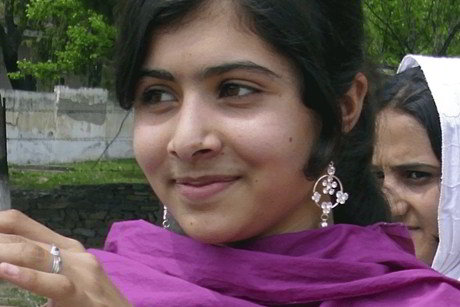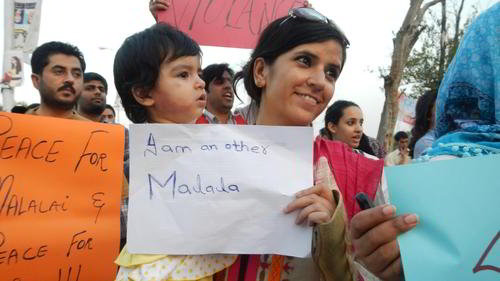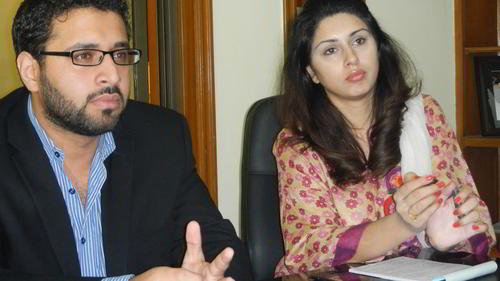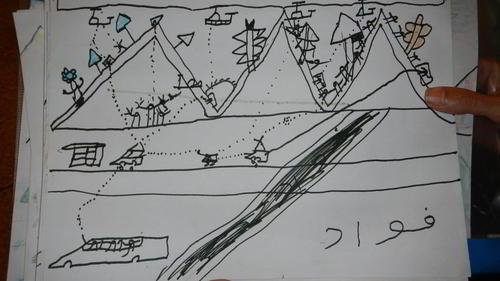Let's talk about the Taliban
| 15 Oct 2012: posted by the editor - Features, Pakistan | |
|
By Pam Bailey
The shooting of 14-year-old Malala Yousafzai in Pakistan's Swat valley this week brought a rush of emails into my inbox, from acquaintances who knew I was in the country as part of a delegation focused on highlighting the tragic consequences of drones. Malala won fame in 2009 during Pakistani army operations to crush a Taliban insurgency that had taken hold in the Swat valley, near the Afghan border. At a young age, she campaigned for girls' right to attend school, and she wrote an anonymous blog for the BBC about the chaos at the time, including the burning of girls' schools. She wrote: "I had a terrible dream yesterday, with military helicopters and the Taliban. I have had such dreams since the launch of the military operation in Swat. My mother made me breakfast and I went off to school. I was afraid going to school because the Taliban had issued an edict banning all girls from attending schools. Only 11 students attended the class out of 27. The number decreased because of Taleban's edict. My three friends have shifted to Peshawar, Lahore and Rawalpindi with their families after this edict. On my way from school to home I heard a man saying 'I will kill you'. I hastened my pace and after a while I looked back to see if the man was still coming behind me. But to my utter relief he was talking on his mobile and must have been threatening someone else over the phone." Her efforts were recognized by Pakistan's prime minister, who awarded her the country's first National Peace Award. Malala had also spoken of her desire to one day form her own political party. But all the publicity reportedly displeased the Pakistani Taliban, which was said to have put her and her family on its "hit list" for backing "the imposition of a secular government" in Swat. And accordingly, the newspapers here in Pakistan reported that the Taliban has claimed credit for shooting Malala in the head while on her way home from school. On Thursday, it was reported here that doctors in a military hospital in Peshawar had removed the bullet that passed through her head and lodged in her shoulder, and that she had stabilized but was still on a ventilator. She was given a 50-50 chance of recovering. Much of Pakistan—as well as the rest of the world—erupted in outrage over this brutal crime. And rightly so. We did not have the chance to meet her, of course, but I heard many stories about Malala's amazing courage and commitment to promoting the rights of Pakistani girls. (Note that I did hear some concerns that Malala had been pushed to be so "out in front" by her father, a strong advocate of girls' education and headmaster of her school, as well as by certain NGOs. However, her courage is undeniable.) The condemnation of Malala's shooting was universal, but the discussion—often very heated—around it soon took on a false dichotomy: Drones. vs. the Taliban, as if it's an either-or choice. On one end of the spectrum are Salima, a Pakistani documentary filmmaker and human rights activist, and her friends. (I am not using their real first names, at their request, to protect their security.) A small group of women from the CODEPINK delegation met with Salima and a few of her fellow activists, and they didn't mince any words. The drones, they said, are a "lesser evil" than the Taliban, and they knew of no other way to destroy the extremist movement, which they called a "Stage V cancer"—except maybe a "nuclear bomb." "The Pakistani army is not able to deal with them," said Jamila, whose husband was killed by a remote-controlled bomb on his car after he spoke out against the Taliban while running for office in Swat. "The people want them finished!" (When pressed, the women labeled the use of drones—and the collateral damage they inevitably cause—as "morally wrong." Likewise, they said they did not want U.S. troops to bring their version of "justice" to the Pakistani people. That is Pakstan's job. However, it seemed to me that these qualifications were more to appease us, given our public stance against the drones and American troops on Afghan soil. Earlier in our conversation, before we probed further, they stated their belief that drones were more "precise" in their damage than any other weapon, and shared their fear that the United States would abandon the region just as Russia did, clearing the way for the Taliban to return full force in both countries.)
"Dialogue with the Taliban doesn't work. There are no good (members of Taliban). They are all bad," said Faridah, Samila's sister. "We want a politician who condemns the Taliban straight out!" However, these women do not live in the region of Pakistan targeted by U.S. drones, which have left the residents terrified of gathering in groups for even school, weddings or funerals. And after hearing testimony from many drone victims, reading a recent investigative report from Stanford Law School and talking to a female Pakistani lawyer about her thesis on what motivates terrorist recruits, I am convinced that the two (drones and the Taliban) cannot be considered separately. The former "feeds" the latter. "I interviewed 16 youth from Waziristan, all under the age of 21, who are now sentenced to Pakistani prisons for becoming attackers for the Taliban," explained Anum Abbasi, an associate with the Research Society of International Law (RSIL) in Islamabad. "What became clear from this empirical research (not yet published) is that a primary motivator is the U.S. drone strikes. They breed anger, hatred and desperation." And most certainly, anti-American sentiment.
The anti-American backlash caused by the drones was emphasized by Imran Khan in a CNN interview Oct. 10 with Christiane Amanpour. She grilled Khan about allegations from his opponents that he is "pro-Taliban" because he tries to engage with individuals affiliated with the movement. He responded—I think very convincingly—that a military solution can never work and that people join the Taliban for different reasons. (The same is very true for Hamas.) The "hearts and minds" of those who join out of a sense of survival, or because of anger at the collateral damage from the drones, can be won over, Khan insisted. But first, the drone strikes that serve so effectively as recruiting tools must stop. Zainab, another Pakistani feminist (whose name has been changed), points out that a number of factors have led to the rise of the Taliban and the corruption of the government of Pakistan—most of them initiated or accelerated by the United States, but off the radar for most Americans, who merely decry the Taliban. They include the nurturing of the "mujahadeen" (which later became the extremists targeting the United States) by the CIA during the Soviet occupation of Afghanistan, the funneling of millions of dollars for those forces through the Pakistani government, the continuing presence of U.S. troops next door (another "recruitment tool"), crushing debt obligations imposed by the International Monetary Fund and a lack of equal emphasis on an enduring truce with India. "It's for all these reasons that the United States has replaced India as the chief target of Pakistani animosity," observes Muhammad Oves Anwar, another associate at Pakistan's RSIL. "Unfortunately, most people here don't see international law as 'real.' Who can blame them? But we are trying to change that." Perhaps the saddest reality upon which most Pakistanis can agree is that the people, particularly the children, are caught in between two evils—U.S. drones and the Taliban they help prop up.
"People are seeing hope in the judiciary," he said. "I think a real movement has been sparked." I also see hope in Imran Khan, as controversial as he is in some sectors, and despite the fact that he is not progressive across the board. When he answered Amanpour's question about who he would support as the next president of the United States, he said, "I will support anyone who is anti-war. Why can't we just give peace a chance?" Corny? Perhaps. But the Americans in my room, and many Pakistanis, thrilled to the words. Tags: Taliban, Gaza, Hamas, Pakistan, Malala Yousafzai |
|
|
|
| Name: | Remember me |
| E-mail: | (optional) |
| Smile: | |
| Captcha | |




